Best Cities to Retire in Florida
Updated:
Retirement Living takes an unbiased approach to our reviews. We may earn money when you click a partner link. Learn More
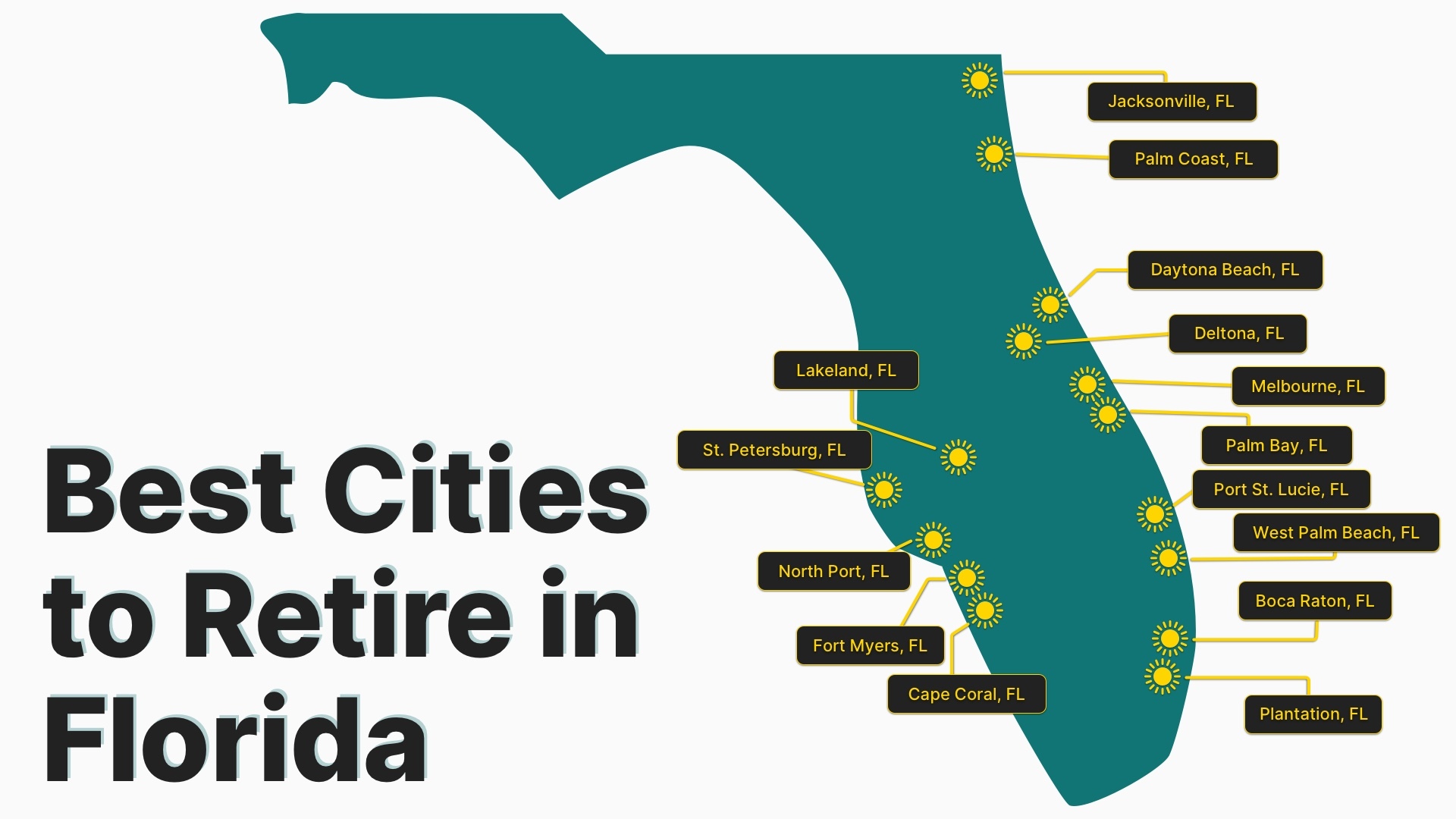
Warm, sunny Florida is well-known as an ideal spot for retirement. There are no retirement taxes, no income taxes, and the climate is mild year-round. Homelessness and crime are relatively low in Florida, too, according to data from the FBI. In fact, the biggest trouble you may find when retiring to Florida is deciding where to live.
To help with that, Retirement Living analyzed the top metropolitan areas in the Sunshine State to identify our 15 best cities in Florida to retire in. To come up with our list, we looked at population and population growth (per the U.S. Census), median home and rental prices, average household income, percentage of persons in poverty, and the percentage of residents age 65 or older. The resulting 15 cities are ideal for seniors, whether you’re looking to spend your retirement years active and on-the-go, or you’re looking for some warmth and R&R.
If you’re interested in retirement options beyond Florida’s borders, don’t miss our list of the 10 best U.S. cities for retirement and our collection of the best and worst states to retire in.
Best Cities to Retire in Florida
15. Jacksonville, Florida

- Population: 971,319
- Share of population 65+: 13.9%
- Average household income: $58,263
- Median home price: $203,400
- Median rent price: $1,146
- Poverty rate: 14.90%
Retirees looking to make lots of new friends may want to consider Jacksonville, Fla., the biggest city in the U.S. by area and the most populous city in Florida. Like many of our top Florida picks for retirees, Jacksonville offers a number of affordable housing options. If health is a concern, you can get your heart rate up on Jacksonville’s 22 miles of gorgeous beaches, and make sure everything is in good working order with top-notch health facilities, including the Mayo Clinic.
14. West Palm Beach, Florida
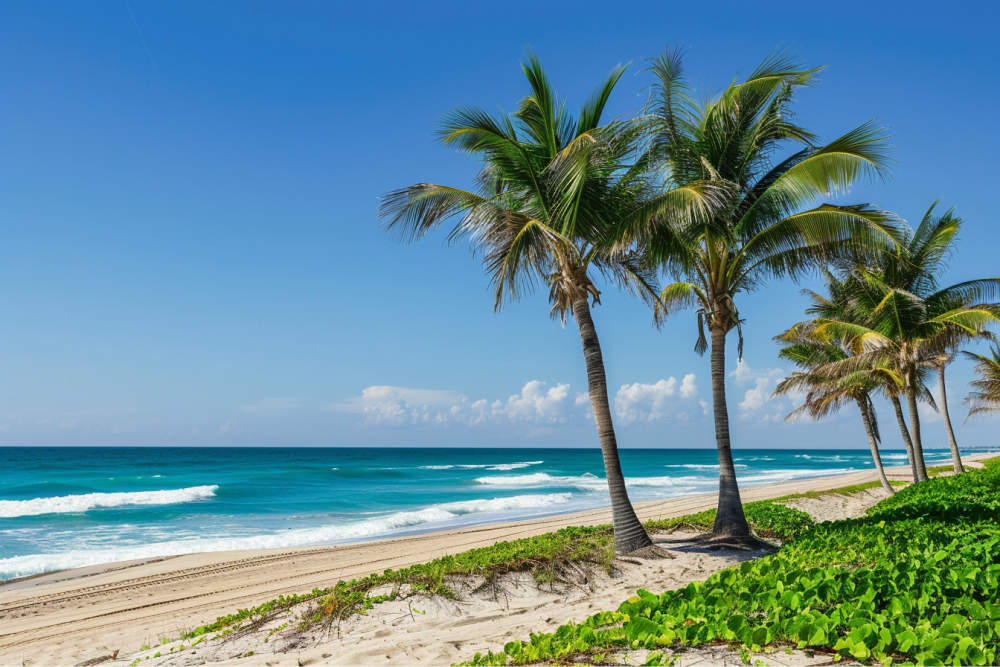
- Population: 120,932
- Share of population 65+: 19.70%
- Average household income: $56,549
- Median home price: $275,700
- Median rent price: $1,446
- Poverty rate: 17.00%
Like the night life? West Palm Beach may have the vibe you’re looking for. This Atlantic coast city is about two hours north of Miami and offers fine dining, theater, museums, concerts, shopping, and more. Retirees in West Palm Beach will enjoy the relatively low cost of living, as well as plenty of other seniors, whether you choose to live in the upscale condos of downtown or a bungalow near the beach.
13. St. Petersburg, Florida
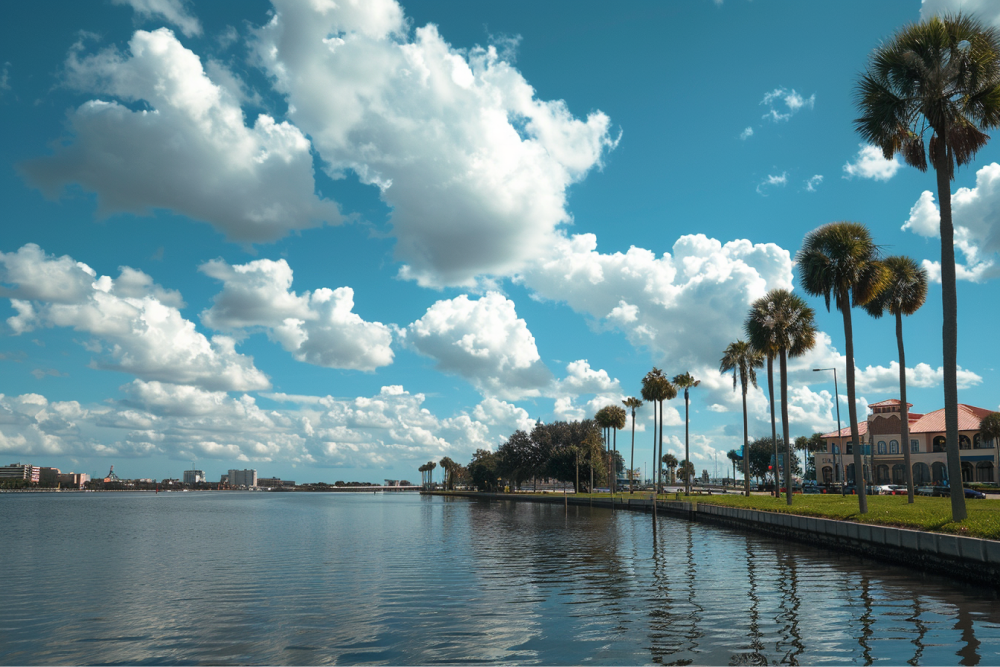
- Population: 261,256
- Share of population 65+: 19.30%
- Average household income: $64,375
- Median home price: $242,100
- Median rent price: $1,259
- Poverty rate: 12.40%
St. Petersburg is a bustling city on the Gulf of Mexico, with almost one-fifth of its population age 65 and older. Situated near Tampa, St. Petersburg offers plenty of arts and culture for the creative-minded, plus plenty of outdoor recreation (can’t beat the South Florida weather!). Like much of Florida, you can expect plenty of traffic, but the city hasn’t been booming in growth like some other places, which may keep the crowds more manageable.
12. Plantation, Florida

- Population: 96,042
- Share of population 65+: 16.50%
- Average household income: $79,893
- Median home price: $353,400
- Median rent price: $1,816
- Poverty rate: 9.70%
Just outside Fort Lauderdale lies Plantation, Fla., a Broward County suburb with many families, professionals, and a slightly smaller share of seniors than some of our other top picks. While median rent and home prices are on the higher side, Plantation offers plenty for those looking for a comfortable, cozy place to put down new roots. Retirees can check out the area’s numerous parks, golf courses, coffee shops, and eateries, or spend a few hours at one of the many specialty museums nearby.
11. Melbourne, Florida
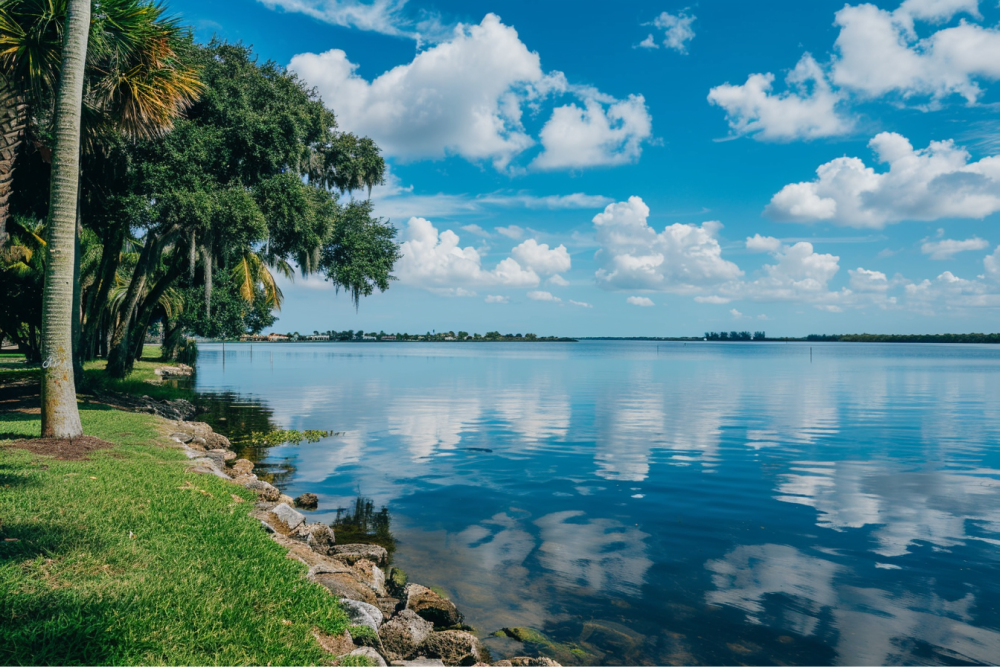
- Population: 86,441
- Share of population 65+: 21.50%
- Average household income: $55,543
- Median home price: $200,900
- Median rent price: $1,159
- Poverty rate: 13.70%
Melbourne has attracted retirees for years, thanks to its affordable cost of living and variety of coastal activities. Residents can enjoy fishing and other recreational activities near its many beaches and piers, or pause to witness a space launch from nearby Cape Canaveral and the Kennedy Space Center. With median rent just $1,159, Melbourne may be more affordable for seniors trying to stretch their retirement dollars than many other ocean-adjacent locations.
10. Boca Raton, Florida
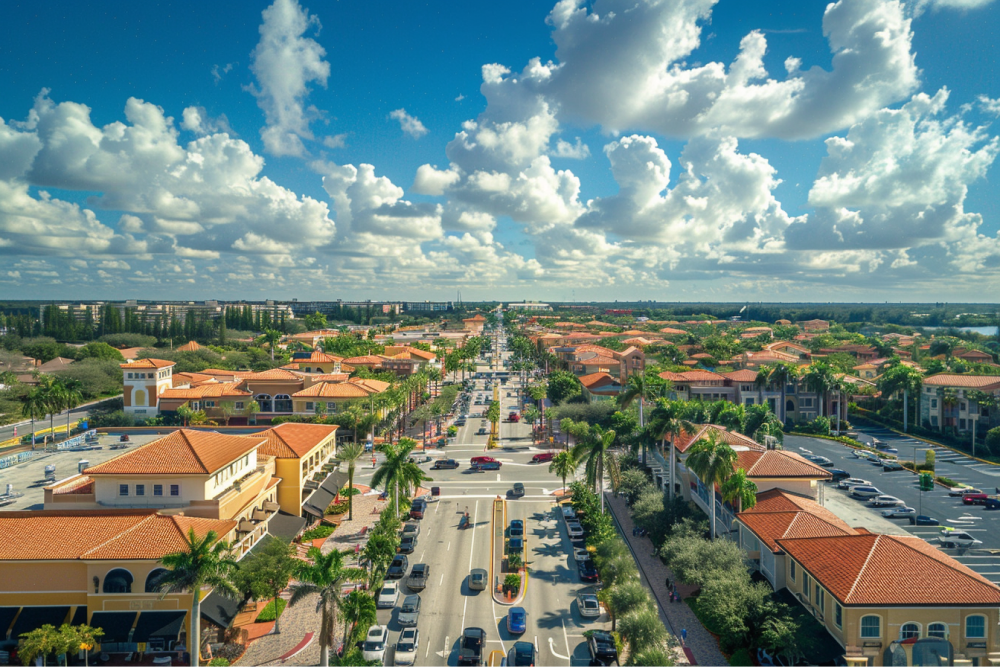
- Population: 99,009
- Share of population 65+: 26.30%
- Average household income: $89,776
- Median home price: $495,000
- Median rent price: $1,941
- Poverty rate: 9.20%
Ready to enjoy your golden years in style? In Boca Raton, more than a quarter of the city’s residents are age 65 or older, and the average household income is the highest of our picks — although that means housing prices are high, too. If Boca Raton suits your budget, you’ll enjoy upscale shopping, many opportunities for fine dining, and four miles of gorgeous beaches to wander. Plus, the city’s thriving arts scene and multiple boat clubs provide a great way to meet other like-minded seniors.
9. Deltona, Florida
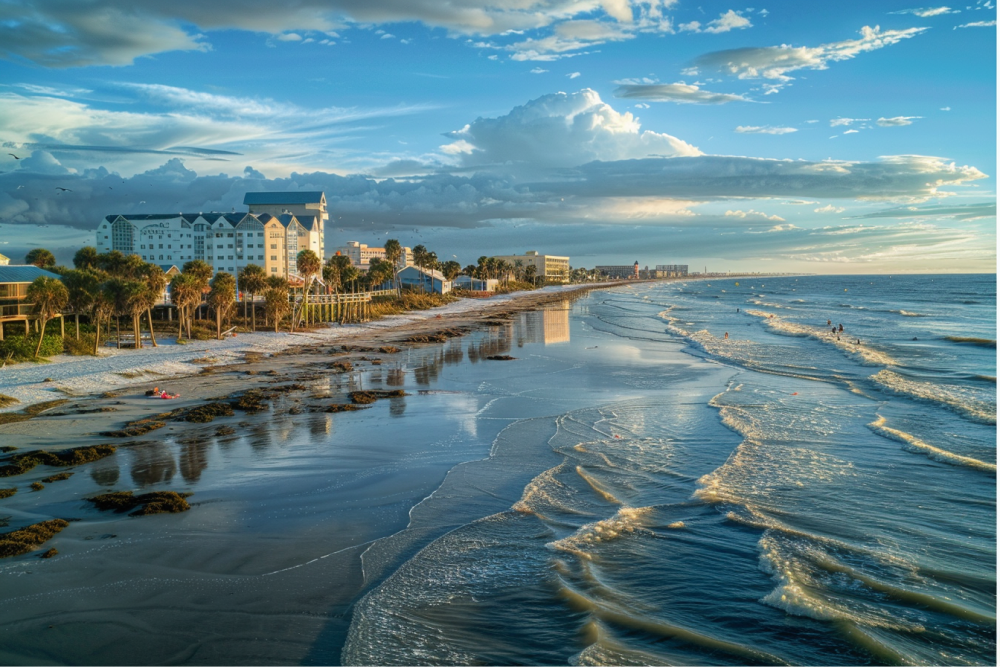
- Population: 97,267
- Share of population 65+: 16.20%
- Average household income: $62,768
- Median home price: $184,300
- Median rent price: $1,236
- Poverty rate: 11.10%
Seniors looking to optimize their taxes may want to take a look at Deltona, Fla. An affordable inland city just northeast of Orlando, Deltona offers plenty to do and the same favorable tax laws as the rest of the state, including no income tax. But as an added bonus, you’ll pay just 6.5% sales tax on your purchases, too — less than the typical statewide sales tax rate of 7%. Deltona’s not far from the beach and also offers easy access to I-4 and I-95, making it easy for retirees to travel the state and maximize their fun.
8. Daytona Beach, Florida
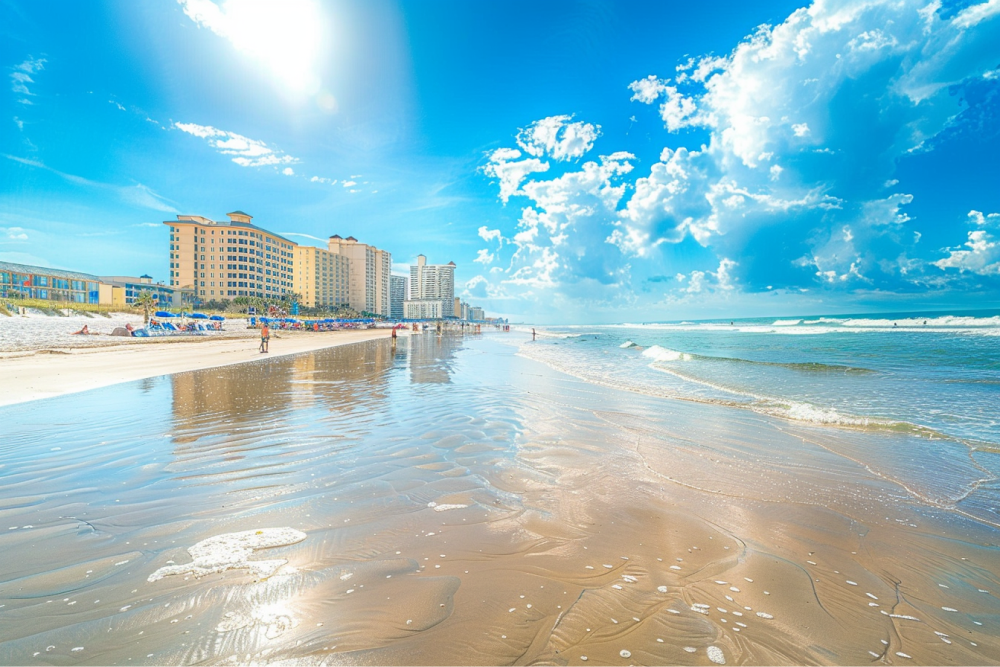
- Population: 77,958
- Share of population 65+: 20%
- Average household income: $42,392
- Median home price: $176,800
- Median rent price: $1,066
- Poverty rate: 21.80%
This bustling Atlantic coast beach town may be best known for the Daytona 500, a NASCAR cup race held each year at the Daytona International Speedway. But Daytona is also a paradise for seniors who aren’t race fans. An even 20% of its population is age 65 or older, and seniors can find affordable housing as well as a low cost of living while settling down near Florida’s best-known beach.
7. Lakeland, Florida
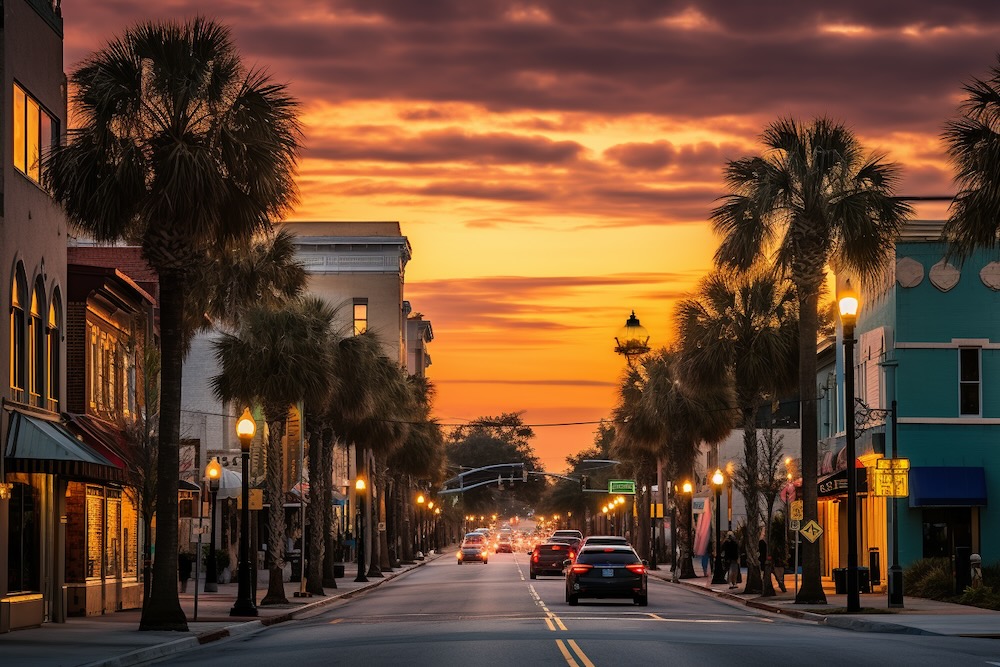
- Population: 120,071
- Share of population 65+: 21.8%
- Average household income: $52,972
- Median home price: $171,700
- Median rent price: $1,115
- Poverty rate: 15.1%
Another affordable option for seniors, Lakeland, Fla., boasts an amazing blend of the urbane and the outdoorsy, with more than three dozen lakes and several respected colleges. Florida Southern College even features a record-setting collection of Frank Lloyd Wright architecture. In addition to numerous recreational opportunities and plenty of other seniors for company, you’ll also enjoy access to high-quality health care in this Polk County city, with convenient providers at Lakeland Regional Health Hospital and other health centers.
6. Palm Bay, Florida
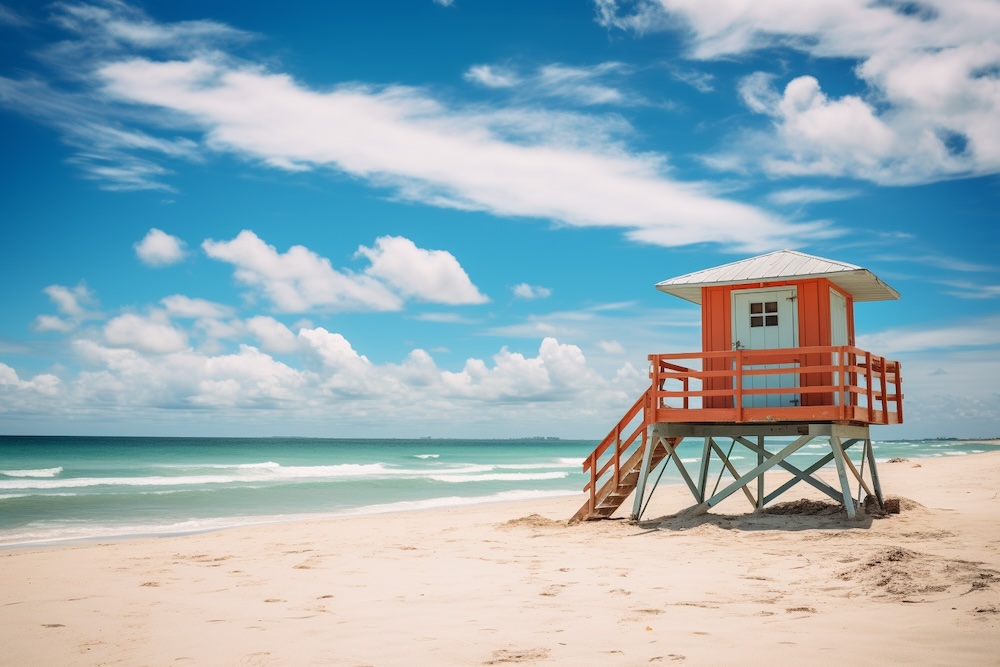
- Population: 129,234
- Share of population 65+: 18.1%
- Average household income: $55,963
- Median home price: $186,100
- Median rent price: $1,220
- Poverty rate: 13.1%
Palm Bay is one of our top ten Florida cities to retire in thanks to its affordable home prices, small-town feel, and access to numerous parks, beaches, and nature sanctuaries. Palm Bay added about 10,000 new residents since 2020, ensuring a thriving local economy and services. Situated midway along Florida’s Eastern coast, just south of Melbourne and along the Indian River, the city and its namesake bay offer beautiful places to get away and enjoy a little peace and quiet.
5. Fort Myers, Florida

- Population: 95,949
- Share of population 65+: 21.6%
- Average household income: $51,682
- Median home price: $263,800
- Median rent price: $1,162
- Poverty rate: 16%
We love this Southwestern Florida city — and so do many others! The population in Fort Myers has expanded by almost 10% since 2020, and it’s no wonder, thanks to its low cost of living. You’ll pay lower sales taxes, too: 6.5% compared to the average 7% in our other top Florida picks. Retirees relocating to Fort Myers will enjoy affordable rentals, plenty of scenic waterways, and numerous transportation options, too, including the Fort Myers Beach Trolley for local jaunts and the Southwest Florida International Airport for more far-flung destinations.
4. Port St. Lucie, Florida
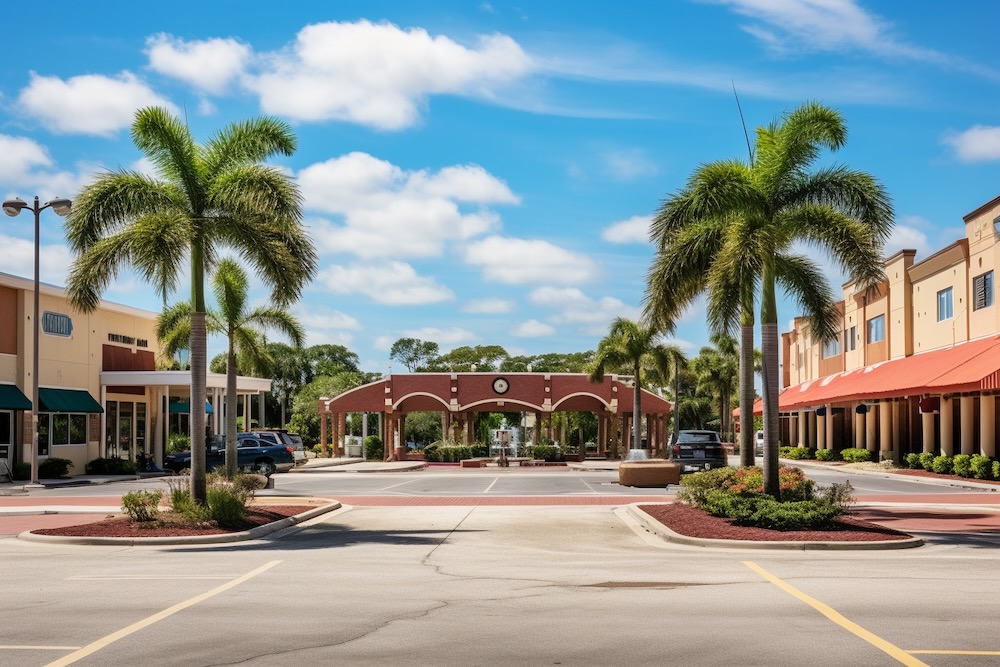
- Population: 231,790
- Share of population 65+: 20.4%
- Average household income: $68,647
- Median home price: $245,900
- Median rent price: $1,604
- Poverty rate: 8.3%
Port St. Lucie, Fla., is a hot destination for retirees and growing quickly. With a wide selection of golf courses (many of them PGA-ranked), parks, natural recreation areas, and waterways, seniors who enjoy the outdoors will find plenty to keep them occupied in the Florida sunshine. Located along the Eastern coast about an hour north of West Palm Beach, Port St. Lucie offers several planned communities, including Tradition, the Villages, and Latitude Margaritaville — ideal for finding a new community of your own in retirement.
3. Cape Coral, Florida
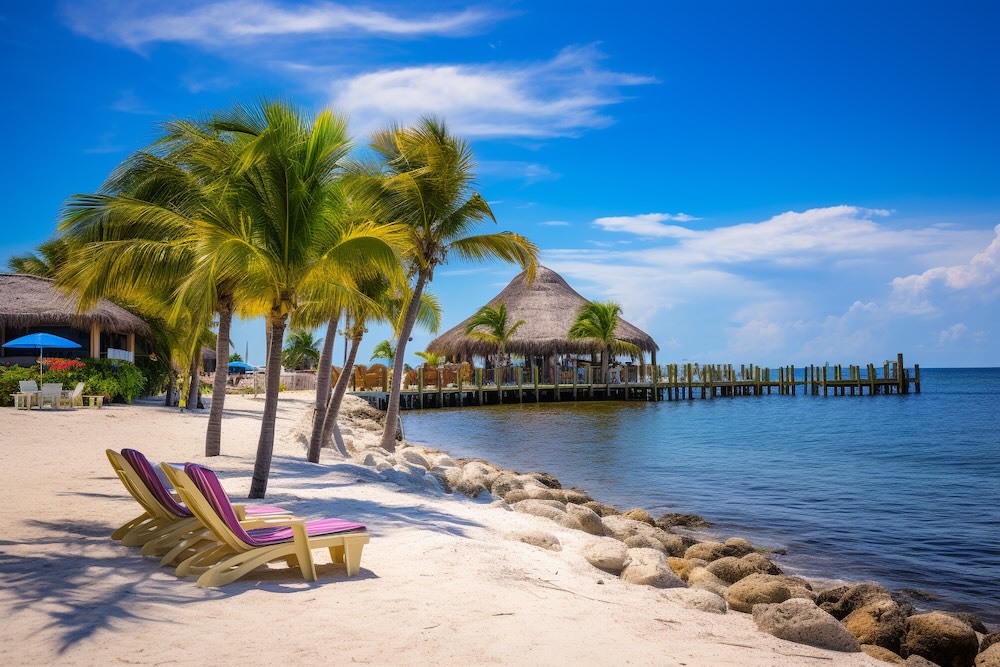
- Population: 216,992
- Share of population 65+: 24.4%
- Average household income: $65,282
- Median home price: $255,700
- Median rent price: $1,456
- Poverty rate: 9.9%
This booming seaside city on Florida’s southwestern Gulf coast has long been revered as a wonderful place to retire, as evidenced by the fact that almost 25% of Cape Coral, Fla., is age 65 or older. Is it the top-quality golfing? The incredible seafood? The hundreds of miles of canals, rivers, and coastline? Or the low taxes? No matter what you’re looking forward to in retirement — rest, relaxation, or recreation — Cape Coral has it, and more and more people want it. The city’s population rose by nearly 23,000 people since 2020, according to U.S. Census data, yet the area’s still relatively affordable for many seniors.
2. Palm Coast, Florida

- Population: 98,411
- Share of population 65+: 29.1%
- Average household income: $61,847
- Median home price: $238,700
- Median rent price: $1,461
- Poverty rate: 11%
Seated between St. Augustine to the north and Daytona Beach to the south, nearly 30% of this northwest Florida city’s population is over 65. Retirees are drawn to Palm Coast’s relaxing blend of safe, comfortable neighborhoods, sandy beaches, and pristine natural beauty. There’s also plenty of fishing, boating, tennis, golf, and hiking to keep you busy, or try your hand at bird-watching or dolphin-spotting along the city’s well-maintained wildlife trails.
1. North Port, Florida
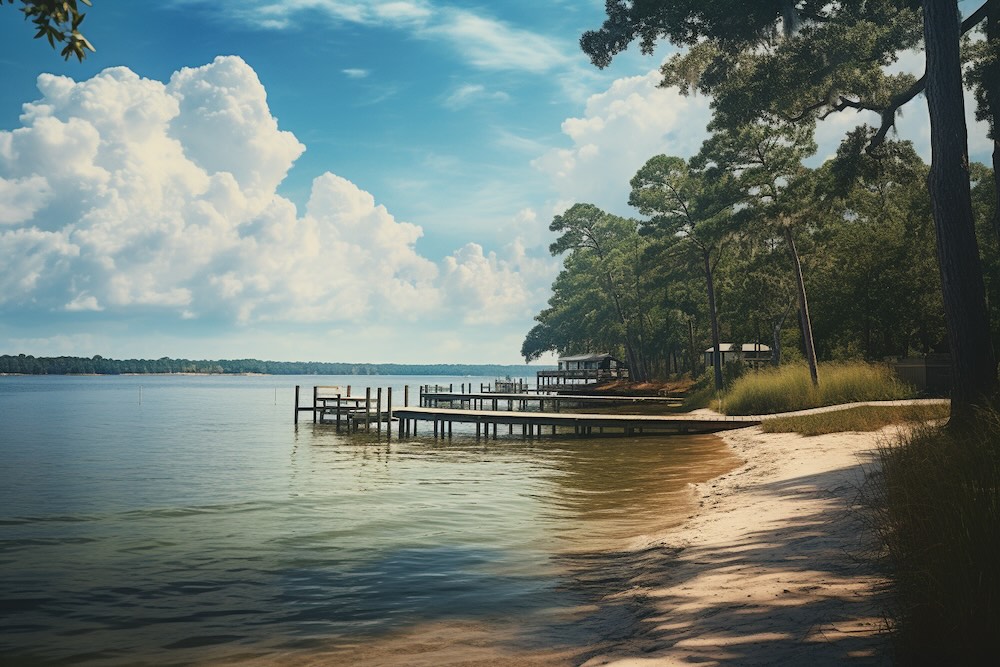
- Population: 85,099
- Share of population 65+: 27.2%
- Average household income: $69,265
- Median home price: $227,400
- Median rent price: $1,349
- Poverty rate: 5.6%
We’ve selected North Port as our No. 1 Florida city to retire in for several reasons: it’s extremely safe, affordable, beautiful, and pleasant all year round. Smaller than many other selections on our list, North Port is nevertheless growing reliably, expanding by 11% since 2020. Seniors in North Port will enjoy a bit less rain than other Florida residents, providing additional opportunities to enjoy the water at Warm Mineral Springs Park, take in a little batting practice at the Atlanta Brave’s spring training facility, or soak in the natural beauty of Myakkahatchee Creek Environmental Park. And with North Port’s planned residential neighborhoods, affordable home prices, and proximity to both Tampa and Orlando, you’ll find it easy to feel at home.
Retiring In Florida: A Disclaimer
Although our data ranked several cities in Florida as promising retirement communities — due in part to favorable legislation for seniors and retirees — it’s worth noting that the state has seen an influx of people moving there in recent years, and sometimes the data can lag the on-the-ground reality. More relocated to Florida in 2022 than to any other state in the country, with about 318,900 deciding to call the Sunshine State home. This population increase of nearly 2% is much higher than the 0.4% national growth rate recorded between 2021 and 2022.
Such growth has contributed to increases in the cost of living across many aspects of life, as evidenced by the Retirement Living survey respondents currently residing in Florida. Of the Florida-based residents who responded to our survey, 42.8% rated their satisfaction with the state a 3 or less out of 5 (more than 40% of those dissatisfied respondents rated their location a 1). The most common causes for concern were overdevelopment, rising insurance costs, and an increase in traffic.
Methodology
To help readers find the best Florida cities for retirement, we evaluated all cities with populations greater than 80,000 residents. Then, we evaluated 12 government data sources, including the U.S. Census Bureau and the FBI, as well as Retirement Living’s internal resources and more. All data sources were available at the city level, except for the homelessness rate, which was collected at the state level.
To rank each city, we created an equation and standardized each metric so we could compare each data point equally. The data points and their corresponding percent weighting are as follows:
- Population growth (2019 – 2022): 20%
- Persons 65 and older: 10%
- Median monthly mortgage payment: 8%
- Median monthly rent payment: 6%
- Median household income (2022 dollars, adjusted for inflation): 8%
- Persons in poverty: 6%
- Population per square mile: 6%
- Homelessness per 10,000 residents (only state-level data available): 6%
- Sales tax rate, including local taxes: 6%
- Taxes on retirement income: 6%
- FBI crime statistics: 6%
That said, Retirement Living knows that data can only go so far, and what’s happening on the ground has the potential to greatly affect quality-of-life metrics in ways our data points cannot detect. To fill in the gaps, Retirement Living surveyed 1,075 residents aged 55 and older across the U.S. and asked the following questions:
- Would you recommend your city (nearest metropolis) to a friend as a retirement location? Why or why not?
- Which of the following would you say is your most important consideration for determining where to retire: affordability, quality of life, access to health care, or something else?
- How satisfied are you with your retirement in your state, on a scale from 1 to 5, and why?
- Are you willing to move to a state with a more favorable retirement climate? Yes or no?
Fair Use Statement
If you found the information here helpful, we invite you to share it for non-commercial purposes. In return, we ask that you include a link back to this page when doing so.
Sources:
- The United States Census Bureau
- The 2022 Annual Homelessness Assessment Report (AHAR) to Congress, The U.S. Department of Housing and Urban Development
- Retirement Living survey data, November 2023
- Federal Bureau of Investigation Crime Data Explorer
- State Department of Revenue website